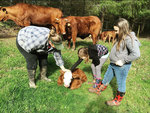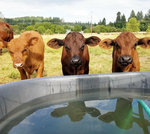

Editor’s Note: The Chronicle is working to assist local businesses suffering from the effects of the COVID-19 virus spread and associated government orders to close or limit commerce. There will be a feature on a local business in each edition of The Chronicle and at chronline.com moving forward. To be considered, email reporter Eric Trent at etrent@chronline.com. Additionally, The Chronicle will continue to offer its coverage of the coronavirus and its effects across the community, state and nation free outside of our paywall at chronline.com.
Rehoboth Ranch near Vader started as a hobby farm and turned into a family-run beef business.
The small, pastoral farm on Winlock-Vader Road just northwest of Vader began when Rusty and Carrie Cox bought the 30-acre plot in 1989. It’s main purpose was to raise a few cows and harvest the meat to share with family members.
When the Coxs bought an additional 30 acres adjacent to their property in 2013, they called upon their daughter, Robin Cox, to come help them switch to a business farm.
“That’s when they decided it would be a good time to branch out from a hobby farm and see if we could make it bigger,” Robin said. “Could we service more people than just immediate family?”
Robin, who grew up in Winlock and graduated as a Cardinal, was working at YMCA of the Inland Northwest in Spokane at the time and decided to move back to Winlock to help her parents run the farm. She was stuck in a middle-management position that wasn’t going anywhere so she thought, why not?
“I was like, ‘Yeah, that sounds like a great, new, fun adventure,’” Robin said.
It was a satisfying experience for Robin, who found she’d rather put her time and efforts into helping the family business rather than for a faceless corporate business where she had no room for advancement.
“Taking care of these animals until they’re harvested is so rewarding for me, to see all my physical time, energy and emotional energy is going into something really productive instead of just the bottom line for another company,” Robin said.
Robin has no official job title. Every single job on the farm falls to Robin and her parents at some point, depending on who’s busy and who’s not. She calls herself the farmhand. The family lived in Texas for a short while during her childhood and the hispanic laborers on the ranches where the Cox family lived and work would call Rusty the “patron.” So Robin now calls Rusty the “patron” and herself the farmhand.
Robin and her parents each have jobs of their own outside the farm, as well. Rusty and Carrie own another business, Novus Auto Glass, in Chehalis, and Robin works at an elementary school.
The farm immediately expanded the range of meat and animals it produced in 2013 and began marketing to attract customers. They went from four cows to 22 and Robin bought 30 meat goats as a personal project.
“That was probably a big mistake,” Robin said. “People tell you to start small and work your way up. That was a huge learning curve. No magazine, no article, no blog you read can prepare you for what it’s like to have goats.”
There were days where the goats escaped, they got sick, there were predator problems and they all had babies all at once. Robin came home from working at the school one day to 12 freshly-birthed babies lying on the ground and she didn’t know which babies belonged to which mothers.
She unfortunately had to sell all her goats in July due to the effects of the pandemic after she was laid off from her job at the school and wasn’t sure she could afford goat food and pay her bills at the same time.
“I loved my goats but I was very concerned with the quality of care I could offer them,” Robin said.
The Cox family soon added eggs to their farm. Most of the chickens they initially started with were rescue laying hens that came from people in the city who had bought chicks and could no longer care for them once they were full grown.
The family does not sell eggs to the public. They have a contract with a baker in Vancouver, Washington who bakes wedding cakes and they sell all their eggs to her. It’s about 200-300 eggs every couple weeks.
The ranch currently only sells beef to the public, in quarters, halves and whole. As of right now they have 15 cows in their field, seven breeding stock, five babies born in 2020 and three steers for butchering this fall. The pandemic did have a positive effect on their beef sales as many of their previous buyers are putting in reorders more now than ever, and there is currently a waiting list.
As a result of grocery stores being hit hard during the initial blow of the pandemic, the ranch began receiving an influx of orders. But it takes about two years for a cow to be ready to butcher, and Robin has to find a local butcher who has time and space available. She has to book a year in advance with a butcher. She’s locked in to a rotating schedule now, but has to commit to a certain amount of beef each year.
“People come to me and say, ‘We want 17 tri-tip steaks for our wedding,’” Robin said. “But one cow has one tri-tip. To get 17 you have to butcher 17 cows. The biggest thing for us is educating the consumer.”
Rehoboth Ranch also allows visitors to come see and pet the animals on the farm, including a pot-belly pig who came from a city owner.
“People come out and say, ‘I have never touched a chicken,’” Cox said. “It just blows my mind. I grew up with this stuff. It’s fun to let people experience that. I love having people come out and pet a cow and touch a chicken and step in some poop. That’s the best part.”
Anyone interested in visiting the farm to see and pet the animals or join the waiting list for beef can contact Robin by phone: 360-520-3553 or by email:rehobothranchwa@gmail.com
•••
Reporter Eric Trent can be reached at etrent@chronline.com. Visit chronline.com/business for more coverage of local businesses.